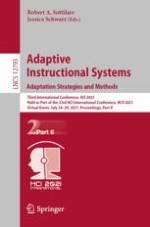2021 | OriginalPaper | Buchkapitel
Measuring Flow, Immersion and Arousal/Valence for Application in Adaptive Learning Systems
verfasst von : Ehm Kannegieser, Daniel Atorf, Joachim Herold
Erschienen in: Adaptive Instructional Systems. Adaptation Strategies and Methods
Aktivieren Sie unsere intelligente Suche, um passende Fachinhalte oder Patente zu finden.
Wählen Sie Textabschnitte aus um mit Künstlicher Intelligenz passenden Patente zu finden. powered by
Markieren Sie Textabschnitte, um KI-gestützt weitere passende Inhalte zu finden. powered by
